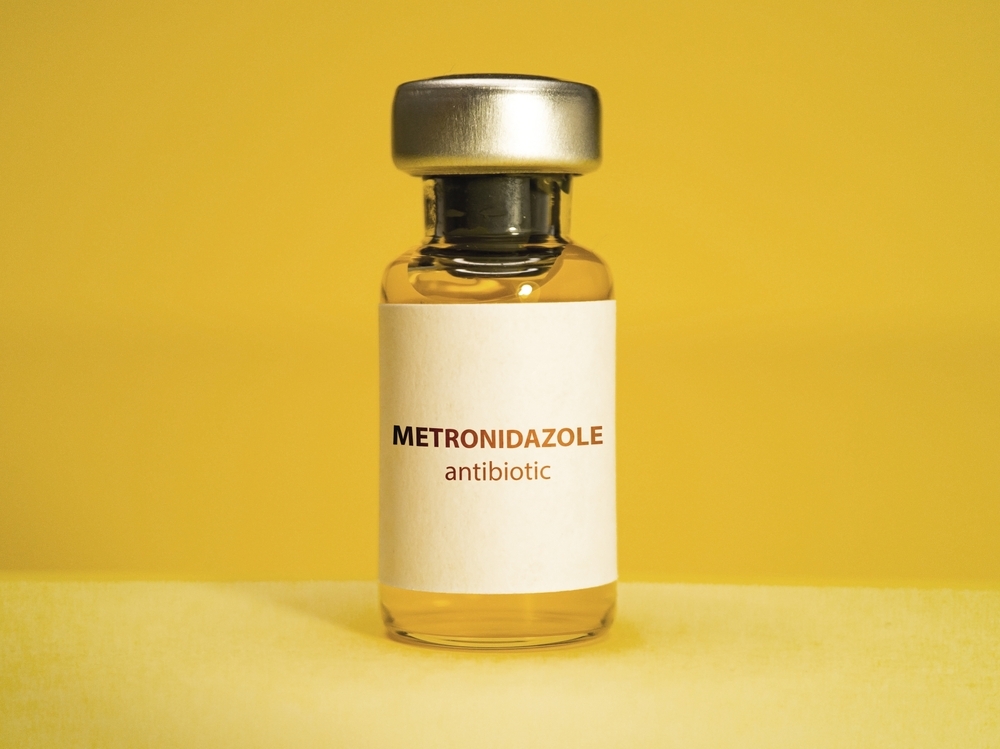Last Updated:
April 7th, 2025
What is metronidazole?
Metronidazole is an antibiotic used to treat a range of bacterial and parasitic infections. It is commonly prescribed for conditions such as bacterial vaginosis, trichomoniasis, certain types of skin infections and gastrointestinal infections caused by anaerobic bacteria.
This medication disrupts the DNA of bacteria and parasites, preventing them from growing and multiplying. As a result, metronidazole effectively eliminates the infection from the body. Because it targets anaerobic bacteria (organisms that thrive in environments without oxygen), it is particularly effective in preventing infections in the intestines and reproductive system.
Metronidazole is widely used and highly effective, but it has a significant interaction with alcohol, which can cause severe side effects.
Can you drink alcohol while taking metronidazole?
No. Drinking alcohol while taking metronidazole is strongly advised against, as it can lead to severe and unpleasant side effects.
Alcohol and metronidazole do not mix well because of the way they are processed in the body. Normally, alcohol is broken down in the liver by an enzyme called alcohol dehydrogenase. This process converts alcohol into acetaldehyde, which is then further broken down into harmless byproducts.
Metronidazole interferes with this process by blocking the enzyme responsible for breaking down acetaldehyde. This causes a build-up of acetaldehyde in the body, which can lead to a toxic reaction known as the disulfiram-like reaction. This is named after disulfiram, a drug used to treat alcohol dependence by making people feel sick if they consume alcohol.
This reaction can happen even with small amounts of alcohol and may last for several hours.
Side effects of mixing alcohol and metronidazole
The side effects of combining alcohol and metronidazole can be intense and include:
- Nausea and vomiting
- Severe headache
- Flushing of the skin
- Rapid heart rate
- Shortness of breath
- Dizziness and lightheadedness
- Abdominal cramps and discomfort
For some people, these symptoms can become severe, leading to extreme dehydration, dangerously low blood pressure or loss of consciousness.
Long-term risks of mixing metronidazole and alcohol
While the immediate effects of mixing metronidazole and alcohol can be unpleasant, repeated interactions can have more serious long-term consequences.
Why would someone mix metronidazole and alcohol?
Even with the potential for unpleasant side effects, it may seem confusing why someone would mix alcohol with metronidazole. However, in many cases, it is not intentional.
What to do if you’ve mixed metronidazole and alcohol
If you have accidentally consumed alcohol while taking metronidazole, you may be feeling worried. The good news is that while the reaction can be uncomfortable, it is usually not life-threatening.
Steps to take immediately
- Drink plenty of water to help flush the alcohol from your system.
- Rest and avoid sudden movements if you feel dizzy or lightheaded.
- Monitor your symptoms to see if they improve within a few hours.
- When to seek medical help
While most people will recover without medical intervention, you should seek emergency help if you experience:
- Severe vomiting or diarrhoea leading to dehydration
- Chest pain or irregular heartbeat
- Difficulty breathing
- Loss of consciousness
These symptoms could indicate a severe reaction that requires medical attention.
How long should you wait to drink alcohol again after taking metronidazole?
Alcohol is a common part of social occasions, and if you have an important event coming up, you may be wondering when it will be safe to drink again.
Metronidazole stays in the body for approximately 48 hours after the last dose but in some cases, traces of the medication may linger slightly longer. To be completely safe, it is recommended to wait at least 2 days after your last dose before consuming alcohol.
Waiting this amount of time ensures the medication has fully cleared from your system, reducing the risk of experiencing any adverse reactions.
Have you struggled to avoid alcohol while on metronidazole?
If you have found it difficult to refrain from drinking while taking metronidazole or if you have delayed taking the medication so you could drink, this may be a sign of a more concerning relationship with alcohol.
Answer the following questions honestly:
- Have you continued drinking despite knowing it could make you feel unwell?
- Have you skipped doses or stopped taking metronidazole so you could drink?
- Have you felt anxious or irritable when unable to drink while on the medication?
- Do you often plan your activities around alcohol?
- Has anyone expressed concern about your drinking habits?
If you answered yes to two or more of these questions, it may be worth reflecting on your relationship with alcohol and considering whether you need support.
I may have an alcohol addiction – what can I do?
If you have found it difficult to stop drinking, even when you know it could harm you, you might be struggling with alcohol dependence. Many people assume that alcohol addiction only applies to those who drink heavily every day, but this is not always the case. If alcohol is influencing your decisions, such as delaying medication or struggling to stop even for a short period, it may be time to seek support.
Sanctuary Lodge provides a professional, caring environment where you can regain control of your relationship with alcohol. Our treatment programme is tailored to your needs, offering a structured yet compassionate approach to recovery.
At Sanctuary Lodge, you will receive:
- A structured detox process to help you safely manage withdrawal symptoms, ensuring you remain as comfortable as possible.
- One-to-one therapy and counselling to help uncover the emotional and psychological reasons behind your drinking.
- Group therapy and peer support to connect with others on the same journey and share experiences.
- Holistic therapies such as mindfulness to support emotional well-being.
- Aftercare planning to provide continued support after treatment, helping you stay on track in the long term.
If you are concerned about your drinking, you do not have to face it alone. Reach out to Sanctuary Lodge today and take the first step towards a healthier, alcohol-free life.
(Click here to see works cited)
- Weir CB, Le JK. Metronidazole. [Updated 2023 Jun 26]. In: StatPearls [Internet]. Treasure Island (FL): StatPearls Publishing; 2025 Jan-. Available from: https://www.ncbi.nlm.nih.gov/books/NBK539728/
- Person. “Metronidazole and Alcohol.” GPnotebook, 1 Jan. 2018, gpnotebook.com/pages/infectious-disease/metronidazole-and-alcohol.
- Alonzo MM, Lewis TV, Miller JL. Disulfiram-like Reaction With Metronidazole: An Unsuspected Culprit. J Pediatr Pharmacol Ther. 2019 Sep-Oct;24(5):445-449. doi: 10.5863/1551-6776-24.5.445. PMID: 31598109; PMCID: PMC6782120.
- “Clinical Relevance of Metronidazole and Peripheral Neuropathy: A Systematic Review of the Literature.” International Journal of Antimicrobial Agents, Elsevier, 5 Sept. 2017, www.sciencedirect.com/science/article/abs/pii/S0924857917303321.
- “Common Questions about Metronidazole.” NHS Choices, NHS, www.nhs.uk/medicines/metronidazole/common-questions-about-metronidazole/. Accessed 7 Mar. 2025.




